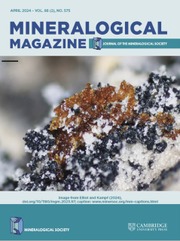Article contents
Geochemical effects of magma addition: compositional reversals and decoupling of trends in the Main Zone of the western Bushveld Complex
Published online by Cambridge University Press: 05 July 2018
Abstract
The Main Zone of the Bushveld Complex, which is ˜3–3.5 km thick, comprises a sequence of gabbronorites with minor anorthosites and pyroxenites. The Pyroxenite Marker (PM), a thin orthopyroxenite layer occurring towards the top of the Main Zone in the eastern Bushveld, marks the change from an inverted pigeonite-bearing microgabbronorite below, to a primary orthopyroxene-bearing porphyritic gabbronorite above. In the western Bushveld the PM has only been observed in core material although its surface position can be inferred from the mineralogical and textural changes. Whole-rock geochemistry of surface and core samples from the Brits and Marikana areas, together with mineral compositional data, have been integrated with published analyses to elucidate the magmatic processes that occurred during the addition of new magma into the chamber, just below the level of the PM. Modal and major-element data show that most lithologies lie close to the plagioclase-two pyroxene cotectic. However, there are three units below the PM in which distinct modal layering is developed. Changes in geochemical trends for trace-element abundances in both whole-rock and mineral-separate data occur at ˜150 m below the PM, below a layered package, the Hexrivier Unit. However, there is a displacement of at least 40 m between the beginning of the reversals in An content in plagioclase and in Mg# in pyroxene which occur at 124 m and 80 m below the PM respectively. In addition, a gradual change occurs in the mineral parameter Mg# in opx minus An in plagioclase, with the plagioclase becoming more primitive relative to the pyroxene. This decrease and the decoupling of geochemical trends has not been noted in the Main Zone of the Bushveld Complex before. The decoupling between plagioclase and pyroxene compositional reversals is not easily explained by modal effects, an influx of phenocrysts in the new magma, or by infiltration metasomatism. Instead we propose that new magma pulses first entered the chamber some 150 m below the PM and that this magma had a composition that crystallized more primitive plagioclase but similar pyroxene to the magma residing in the chamber. The chamber was intruded by progressively more magma that had a more primitive composition particularly in terms of pyroxene composition. This model can explain the decoupling between plagioclase and pyroxene compositional trends. Continued mixing between resident magma and the new influxes occurred over an interval of ˜150–200 m. Above the PM fractional crystallization processes dominated and continued into the Upper Zone.
Information
- Type
- Research Article
- Information
- Copyright
- Copyright © The Mineralogical Society of Great Britain and Ireland 2002
References
- 21
- Cited by

